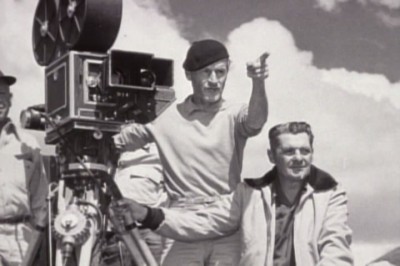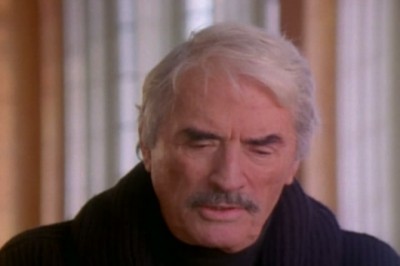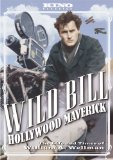| Reviews & Columns |
|
Reviews DVD TV on DVD Blu-ray 4K UHD International DVDs In Theaters Reviews by Studio Video Games Features Collector Series DVDs Easter Egg Database Interviews DVD Talk Radio Feature Articles Columns Anime Talk DVD Savant Horror DVDs The M.O.D. Squad Art House HD Talk Silent DVD
|
DVD Talk Forum |
|
|
| Resources |
|
DVD Price Search Customer Service #'s RCE Info Links |
|
Columns
|
|
|
Wild Bill: Hollywood Maverick - The Life and Times of William A. Wellman
A lot of modern film directors seem to have come from self-taught roots, or academic learning, or have some experience on a prior medium such as television or music videos. All of this is certainly acceptable these days, but in past generations, directors came from some unlikely places, perhaps none so more colorful than that of William Wellman. Before coming to Hollywood, Wellman was an ice hockey player and World War I pilot who was shot down by German gunfire. He survived the crash and was an actor in several films before becoming a director noted for several films, including the Academy award-winning film Wings. Wellman's life is recounted in the documentary Wild Bill: Hollywood Maverick - The Life and Times of William A. Wellman.
The documentary was released in 1995, presumably as part of some sort of commemoration of 100 years since the director's birth. And to be clear, the documentary includes interviews (at the time) with a relative Who's Who in Hollywood. Narrated by Alec Baldwin, the subjects interviewed for the film include Clint Eastwood, Robert Redford, Sidney Poitier and Martin Scorsese. Subjects who have passed since the film was released include Robert Mitchum, Gregory Peck and Richard Widmark. Those who worked with Wellman such as Mitchum and James Whitmore (both nominated for Oscars for their work in Wellman-directed films) talk about what it was like working for him on set, while others like Scorsese provide a peer appreciation of his work. Redford provides a unique insight into him, as he was friends with Wellman's son William Jr., and recalls going over to the Wellman house and his thoughts on the elder William as a father and then as a director when Redford moved into acting and directing. All of the insights are fun and worth viewing.

Baldwin does a fine job of narrating the material and providing additional biographical information on Wellman, including his time before and after Hollywood rather nicely. But for obvious reasons, his time as director and his thoughts on it and the Hollywood studio system are the things that bear the most attention. And at least from this viewer's perspective, he may have had more impact on the cinematic landscape than I realized. For instance, Wellman's Oscar-winning film Wings may show the first onscreen kiss between two men. However, it would appear to have been done less for an expression of love and more for two men who shared the bond of fighting in war, a bond that people share but rarely speak of, and it is one that Wellman knows personally. It is a startlingly powerful scene.
Wellman has also been around some other more memorable moments in the first half of the 20th century film purview. With The Public Enemy, James Cagney shoving a half off a grapefruit into Mae Clarke's face remains fascinating to watch to this day. He also directed the western The Ox-Bow Incident and the foreign legion film Beau Geste, but he cut his teeth on war films and/or films about flying. John Wayne worked with him several times, including on Island in the Sky and The High and The Mighty, films that served as a welcome change of pace in Wayne's repertoire and were entertaining entries in the thriller genre.
For as formidable as Wellman's filmography would appear to be, he always bristled against actors, seemingly working with them without the abstract processes each would seem to approach their roles with. Wellman looked at it as more bombastic and narcissism yet got many excellent performances from them. Women in his films tended to be glossed over or in some cases were talked to by him about how poorly he directed them, as Nancy Reagan recalls in one interview on the feature. And despite these icy relationships, Wellman frequently brought his movies in days before they were due and thousands of dollars under budget, in exchange for lending more of his voice to a film. When the voice began to be taken away by studios, he withdrew from the system almost willingly. His last film was almost two decades before his death in 1975, and he seemed to live a happy life after his time in Hollywood, perhaps as much as he did while he was in it.

Regardless of the circumstances on why he left, William Wellman seemed to leave on his own volition from Hollywood. He did not want to be part of the system anymore and did not need the drama. Goodness knows he had seen much more important things in his life before he considered becoming a director, and came into Hollywood as he left it, on his own, and did what he wanted in the process. Not many more people could boast the intriguing life that William Wellman had, and Wild Bill helps show us why he did what he did, and it is something to behold.
The Disc:Video:
1.33:1 viewing for the documentary. I was not surprised to see this considering that this was likely a made for television (or home video) release at the time, though the material looks about as good as can be expected. Film grain is present while viewing not only on the clips but on the interview subjects, and there is no additional noise in the image, and there is no edge enhancement worth mentioning. It looks as good as it is bound to look.
Audio:Two-channel Dolby stereo rules the film which is also unsurprising. Dialogue sounds good and the movie is given as much room to show off the interviews and film clips as the soundstage is afforded. No rear channels to mirror the front channel work, nor is there a pesky subwoofer to distract you from all the talkiness of it, the source material is given as much due as can be.
Extras:Trailers for the Wellman-directed A Star Is Born (the first version of the story to be told in movies, for the record) and Nothing Sacred, and that's it.
Final Thoughts:Wild Bill does not chronicle Hickok or even Lumbergh, rather it is the amazing, hard to believe life of one of Hollywood's underrated directors, featuring contributions from the 1% of Hollywood elite actors and directors. Technically it is nothing special and includes nothing valuable in the bonus material area, but the disc serves as a valuable history lesson about one of the more noteworthy moviemakers around when films began, and that is worth the time to view in and of itself.
|
| Popular Reviews |
| Sponsored Links |
|
|
| Sponsored Links |
|
|
| Release List | Reviews | Shop | Newsletter | Forum | DVD Giveaways | Blu-Ray | Advertise |
|
Copyright 2024 DVDTalk.com All Rights Reserved. Legal Info, Privacy Policy, Terms of Use,
Manage Preferences,
Your Privacy Choices | |||||||














